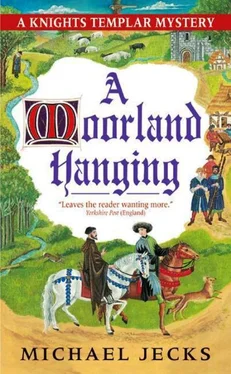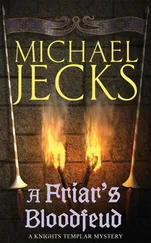Walking toward it, Sir William beckoned the others forward with a proprietorial gesture. Peering inside the box, Baldwin and Simon found themselves staring into the face of a man in his late twenties, slimly built and dressed in a rough sleeveless tunic of thick reddish cloth which left his arms bare.
“Poor devil,” Simon heard Baldwin mutter, and he could easily understand why. Lank dark hair fell over one eye, almost covering it, but not hiding the unfocused stare. Bruther had plainly died from strangling. His eyes were wide and staring in the suffused face, his mouth open, tongue a blackened, bloated mass with a line of toothmarks where his jaws had closed in his death throes. Around his neck were the remains of a hemp rope. It was a light cable, of the kind used for lashing, not the type normally associated with a hanging, and was tied loosely. While the bailiff watched, Baldwin studied the body, his hands resting on the edge of the box while his eyes ranged over the figure. Copying his stance, Simon forced himself to stare down as well.
Bruther’s was not like the other corpses he had seen. He was becoming familiar with death, having viewed men dead from burning and stabbing in the last two years, and all too often he had felt the need to vomit afterward. He had witnessed enough hangings, too, as a legal representative, and seen the results. To his mind, the bodies of those who had been hanged were less distressing than those of murdered people, probably, he knew, because he was content to see the guilty punished, but also because there was less overt violence visible. This one felt different from them because it was that of a man who had been killed for no good reason, without trial, in a violent crime. And Bruther’s end must have been horrific. It was as if the final terror of the victim managed to transmit itself to him, and in his mind’s eye he could imagine the group of men grabbing him, tying his hands, throwing the rope around his neck, hauling the kicking, choking victim aloft, and leaving him there while his face blackened and his eyes rolled. The thought made Simon shiver. He swallowed heavily and turned away.
As usual, Baldwin appeared unaffected by the sight of death. Having finished his quiet survey of the body, he called his servant forward. Edgar had armed himself with a candle, and he held it near the dead man to the knight’s instruction, first next to the feet then slowly moving upward, halting at the hands and wrists, then on up to the face. Last of all Baldwin took the head in his hands and studied it, muttering to himself, not just the face but the scalp as well.
Sir William shot a look of astonishment at Simon, who gave him a weak smile. “Do not worry, Sir William. My friend’s always like this.”
“And lucky I am too!” snorted the crouching knight.
“Right, Edgar. Now, near his neck while I look at the rope.”
“But why?” The older knight tapped his foot impatiently, arms crossed over his chest. “Haven’t you seen enough? The man is dead, and there’s an end to it.”
At this Baldwin glanced up, his face thrown into deep lines and shadows where the orange candlelight caught it. “I don’t know about that yet, sir.” He motioned to Edgar. “Cut the rope from him. Sir William, how can you say there’s an end to it when we don’t know who did it?”
“But as my wife said, it must have been…”
“The miners. Quite. However, I have little doubt that the miners will say it must have been someone else. Who knows – they might even say it was you, Sir William. Now, where did you say this man was found?”
The older man stared from Simon to Baldwin, aghast. “ Me? They wouldn’t dare!”
“Or one of your sons,” Baldwin continued cheerfully. “That is why we must study this body, to see whether there is any evidence about who really did kill him. So, where was he found?”
“In… in Wistman’s Wood – a little wood some distance from here.”
“And he was hanging from a tree?”
“Yes. My men saw something swinging as they passed by. When they looked, they found his body.” Sir William was still wide-eyed with shock.
“Thank you. I think it might be interesting to see where this was, if you don’t mind. Could you ask one of the men to take us there?”
“Yes. Yes, I suppose so, if that’s what you want. I’ll arrange it.”
“Good. Now… ah, thank you, Edgar.”
Taking the heavy cord from his servant, Baldwin studied it carefully. It was strong hemp. Edgar had cut it from the neck, preserving the knot so that the interwoven threads could be studied in one piece. While Simon watched, Baldwin tested the noose, pulling at the knot so that it ran up and down the rope easily. Then the knight threw a glance at the body. Simon held out his hand, and Baldwin wordlessly passed him the rope. He was concentrating on the figure again, oblivious to the others in the room.
Simon had always had a squeamish side to him which the knight found either endearing or infuriating, depending on his mood at the time. For Baldwin, who had experienced warfare and seen death in many forms, there was a certain fascination in a new corpse. He was driven by a pure curiosity, not to prove a principle, but merely to find truth. Each time he saw a new body, he wanted to study it, and discover the reasons behind the death, as if the corpse could explain to him if he would but listen and observe. And he was determined to give each the time it needed to tell him.
Long ago he had realized that when a man or woman died in a specific way, the signals were roughly the same for others dying from a similar cause. From experience, then, it was clear enough that this man had died from hanging. That was plain from the marks on the face. Baldwin had seen them often before in hanged men, and he nodded to himself as he noted them dispassionately. The skin of the head and upper neck was a dusky color; the eyes had small red hemorrhages in their whites; the cheeks and scalp, when he pulled some hair aside, showed even more. No, he had no doubt that this man had died of being throttled.
He stood back and surveyed the body. One thing was niggling him. When he studied the neck wound itself in more detail, he could see something that looked odd. The rope had lain across the neck, and a thick mark was visible where the skin had been pulled away in places. It was, he decided, a little like a long blister, as if a thin scraping had been peeled away to leave the weeping, exposed flesh. Logically, he considered, it must be a kind of rope burn. But what confused him was the second mark. Underneath the heavy scar was a narrower line, stretching from one side of the throat to the other. He took the candle from Edgar and held it closer.
“Is that all? Or do you want to stay here all afternoon?” said Sir William, fidgeting irritably. “It seems clear enough to me. Bruther is dead from the rope – what more do you want?”
Baldwin frowned, then picked up one of Bruther’s hands and stared at it, examining the wrist. Letting it drop, he slowly straightened and smiled at the master of the house. “Yes, of course. Now, if you could take us to the men who found the body, sir, we shall leave you in peace.”
Sir William stomped up the stairs which led to the kitchen, waiting for his guests before marching out into the yard. He gave orders to a guard, who eyed the strangers suspiciously before strolling off to fetch their man. In a few minutes, Samuel Hankyn appeared, looking to Simon like a starving ferret, he was so thin and sharp-faced. He was dressed in russet-colored wool with a leather jacket. Looking enquiringly at his master, he managed to glance at Simon and Baldwin from the corner of his eye as Sir William explained what they wanted.
Before long they were on their way. Judging from the position of the sun, they had a good three hours before dark, and as none of them wanted to be stuck out on the moors when night came, they struck a brisk pace which made conversation difficult. Samuel was out in front, while Simon, riding behind him, felt stiff, his muscles protesting at so much time spent in the saddle. After a half-hour, they turned off northward in a broad valley between two low hills.
Читать дальше












